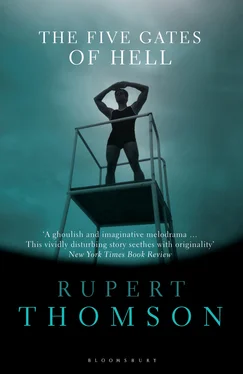Rupert Thomson - The Five Gates of Hell
Здесь есть возможность читать онлайн «Rupert Thomson - The Five Gates of Hell» весь текст электронной книги совершенно бесплатно (целиком полную версию без сокращений). В некоторых случаях можно слушать аудио, скачать через торрент в формате fb2 и присутствует краткое содержание. Год выпуска: 2012, Издательство: Bloomsbury UK, Жанр: Современная проза, на английском языке. Описание произведения, (предисловие) а так же отзывы посетителей доступны на портале библиотеки ЛибКат.
- Название:The Five Gates of Hell
- Автор:
- Издательство:Bloomsbury UK
- Жанр:
- Год:2012
- ISBN:нет данных
- Рейтинг книги:3 / 5. Голосов: 1
-
Избранное:Добавить в избранное
- Отзывы:
-
Ваша оценка:
- 60
- 1
- 2
- 3
- 4
- 5
The Five Gates of Hell: краткое содержание, описание и аннотация
Предлагаем к чтению аннотацию, описание, краткое содержание или предисловие (зависит от того, что написал сам автор книги «The Five Gates of Hell»). Если вы не нашли необходимую информацию о книге — напишите в комментариях, мы постараемся отыскать её.
The Five Gates of Hell — читать онлайн бесплатно полную книгу (весь текст) целиком
Ниже представлен текст книги, разбитый по страницам. Система сохранения места последней прочитанной страницы, позволяет с удобством читать онлайн бесплатно книгу «The Five Gates of Hell», без необходимости каждый раз заново искать на чём Вы остановились. Поставьте закладку, и сможете в любой момент перейти на страницу, на которой закончили чтение.
Интервал:
Закладка:
‘You were one of his people.’
‘I was his driver. They never told me what was going on.’ He leaned forwards on the table. ‘I think maybe,’ and he paused, and lowered his voice, ‘I think maybe he was even murdered.’
Her face hardened. The bones showed white in the bridge of her nose.
‘You can think what you like,’ she said. ‘It doesn’t make any difference now.’
‘It might make a difference,’ he said. ‘It could.’
She shook her head.
‘You’re not listening to me, Carol. You used to listen to me.’
‘You used to be funny. You’re not funny any more.’
He sat back.
‘I think I’d better go now,’ she said. ‘I only get an hour for lunch.’
‘Yeah,’ he said, ‘you’d better go. You’d better go because it takes you longer than most people.’
She took her bag and put it over her shoulder, then she rose to her feet. She stood beside the table, looking at the ground. ‘It’s not good for me to see you,’ she said. ‘Don’t call me again.’ She moved away across the terrace. He wasn’t the only person who watched her go. It was the limp. It had definitely got worse.
He pushed back from the table suddenly, his chair shrieking on the tile floor, and she was standing in front of him, naked, her arms weighed down with fish. There were fish lying at her feet, some still twitching, some already dead. She looked different, her face seemed rounder and calmer, but he could tell it was her: her right leg was strapped into a metal contraption. He turned away, he looked at the ocean for a while, and when he turned back again, she had gone.
He returned to his car. He was just opening the door when the phone began to ring. He picked up the receiver. ‘Yes?’
‘Jed, it’s Nathan.’
‘What’s up?’
‘We’ve got a problem.’
‘What is it?’
‘Can I meet you somewhere?’
‘At the house?’
‘No.’ Nathan was silent, thinking. ‘Where are you?’
‘Outside the aquarium.’
‘I’ll meet you there. Say in about ten minutes.’
‘Meet me inside.’
‘Where?’
‘In front of the sharks.’ Jed switched his phone off and put it back on its cradle.
In front of the sharks.
His mouth widened an inch. That was a nice touch, that was.
Nathan saw Jed first.
Jed was staring up into the Deep Reef tank, his face close to the glass. It was a vast tank. A pillar of seaweed and kelp grew in the centre, twenty feet high and encircled, near the top, by fish of such untarnished silver that they might have been made of aluminium. Sunlight spilled from somewhere above, turning blond then green as it filtered down through the water.
Nathan moved closer. A shark approached. Swayed past. It moved the way some women moved. Almost as if it had hips.
Jed turned. ‘Leopard shark,’ he said. Then he read from the information panel at the base of the tank. ‘Electro-receptors in their snouts help them to home in on buried prey.’ His teeth glistened. He seemed to relish this notion of homing in.
The shark passed again, its skin a camouflage of beige and grey, its eye slit, bevelled, like the head of a screw. It was strange how the body seemed to move around the eye: the eye seemed fixed, the body seemed to swivel and rotate.
Nathan suddenly felt as if his throat was swelling. It was dark in the aquarium; the only light was the light shed by the tanks. There were so many people, there was nothing to breathe. His hearing began to swirl.
‘Not much air in here,’ Jed said, ‘is there?’
Nathan took a few steps back. He went and stood in front of another, smaller tank. It contained something called Moon Jelly. He heard a woman’s voice. ‘Make a pretty lampshade, wouldn’t it?’ He heard somebody laugh. He was finding air now, close to the glass, a down-draught. He was breathing slowly, cautiously. Soon he felt well enough to return to where Jed was standing. He couldn’t watch the sharks, though; the way they moved was a trigger for nausea.
‘What’s wrong?’ Jed said. ‘Don’t you like sharks?’
‘Tell me something,’ Nathan said. ‘If they’d asked you to do the shark run, would you have done it?’ He paused. ‘Or would you have chickened out?’
Jed smiled that even, unnerving smile of his. ‘I can’t swim,’ he said. ‘Now you tell me something. This problem we’ve got, what is it?’
‘It’s my stepmother. Harriet.’
‘What about her?’
‘She doesn’t want any strangers in the house.’
Jed opened his mouth to speak and then closed it again. ‘She doesn’t want any strangers in the house.’ The way he said it, it sounded like a riddle.
‘That’s it.’
‘You want me to leave. Is that what you’re trying to say?’
‘There’s nothing I can do. I’m sorry.’
‘What about tonight?’
‘I’m sorry.’
Jed turned round. For a while he just looked at Nathan. Then he reached into his pocket and took out a piece of candy and put it in his mouth. Nathan heard the candy shatter between his teeth.
‘Like one?’ Jed said.
Nathan shook his head.
Jed seemed to lose interest in him. He stood close to the glass, his pale eyes tracking fish.
‘Where will you go?’ Nathan asked him.
‘I don’t know,’ Jed said. ‘Worst comes to the worst, I can always sleep in the car.’ Nathan nodded.
‘Can you lend me some money?’ Jed said.
‘How much?’
A shrug. ‘Ten dollars?’
Nathan felt in his pocket, pulled out a few squashed bills. He flattened them out, and counted them. ‘I’ve only got eight,’ he said. ‘Here.’
Jed took the bills and slid them into his back pocket. They walked to the exit. Jed got into his car and rolled the window down. He leaned his elbow on the window. One hand picked at the side of his neck, the other fitted a key into the ignition. A slow drumroll from the engine. ‘See you around,’ he said.
‘See you, Jed.’
Nathan sat on the pale-blue railings that ran along the promenade and watched the Chrysler pull out into the traffic. Though he felt guilty about throwing Jed out, he also felt a sense of relief. It was pretty ironic to think that he had Harriet to thank for this.
As he shifted his position on the railings he saw a man walking across the grass towards him. The man was wearing a dark suit and a white shirt. A tie that had loosened slightly. Dark glasses. He was late thirties, early forties. Maybe it was his faintness earlier on, but Nathan seemed to be breathing pure oxygen now. He couldn’t account for this sudden alertness of his; it seemed to have no origin.
He expected the man to take the steps down to the aquarium, but the man stopped by the railings instead, a few feet away, and stared at the ocean. The man was wearing gloves on his hands. Fawn leather gloves with holes for his hands to breathe through. They must be for driving, Nathan thought. Driving gloves.
The man took a deep breath and then let the air out slowly. ‘You know, when my father died, he asked for the words AND SPRING CAME FOR EVER on his gravestone.’ He smiled faintly, sadly. ‘Maybe I’m sentimental, but I’ve always liked the words. They seem to be saying that death’s just a beginning. That there’s something fresh and new about it.’ He breathed in again, filled his lungs. ‘Days like today, with spring on the way, I can’t help thinking of him.’
A plane slid through the bright air, a finger tracing skin. The same care, the same slow pleasure.
‘Do I know you?’ Nathan said.
‘No.’ The man took off his dark glasses. He was smiling. There were traces of amusement, faint embarrassment. ‘I saw you from my window.’
‘What window?’
‘I live up there.’ The man pointed at the two towers of baroque grey stone that rose above the palm trees at the end of the promenade.
Читать дальшеИнтервал:
Закладка:
Похожие книги на «The Five Gates of Hell»
Представляем Вашему вниманию похожие книги на «The Five Gates of Hell» списком для выбора. Мы отобрали схожую по названию и смыслу литературу в надежде предоставить читателям больше вариантов отыскать новые, интересные, ещё непрочитанные произведения.
Обсуждение, отзывы о книге «The Five Gates of Hell» и просто собственные мнения читателей. Оставьте ваши комментарии, напишите, что Вы думаете о произведении, его смысле или главных героях. Укажите что конкретно понравилось, а что нет, и почему Вы так считаете.












